After many requests, the CMAA now offers the Graduale Romanum, extraordinary form from 1961, in two volume hardcover. Go here to purchase.
Search Results for: graduale romanum
Graduale Romanum 1961, in print in two volumes
- Wednesday, 07 March 2007 16:02
- SacredMusic
- 0 Comments
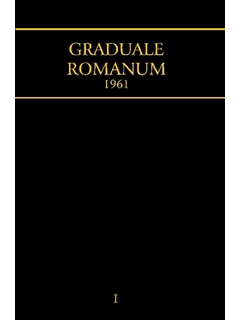 The Graduale is the book for the choirs that contains all the official chants attached to the Mass. This rare edition brings back in print the 1961 Graduale, which includes Pius XII’s Holy Week reforms.
The Graduale is the book for the choirs that contains all the official chants attached to the Mass. This rare edition brings back in print the 1961 Graduale, which includes Pius XII’s Holy Week reforms.
It is the music book for the classical rite (Tridentine Mass, Pius V Missal) but is also valuable for use in the modern Roman Rite. Volume one contains the Propers for Church year, while volume two contains the Propers of the Saints, the Kyriale, the chants for many special Masses, as well as the general index and introduction material. The page count of Volume I is 690, while Volume II is 532.
Kyriale Romanum
- Tuesday, 27 March 2007 16:04
- SacredMusic
- 0 Comments
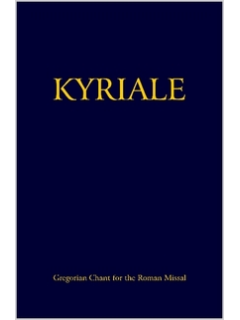 We are pleased to make available a Kyriale extract from the Graduale, with helpful navigation links. The other edition linked on this site is also excellent but it lacks the Solesmes-style rhythmic markings. Thus does this pdf edition fill a gap in our online resources.
We are pleased to make available a Kyriale extract from the Graduale, with helpful navigation links. The other edition linked on this site is also excellent but it lacks the Solesmes-style rhythmic markings. Thus does this pdf edition fill a gap in our online resources.
The book contains all the Mass settings plus Psalm tones for readings and the Gloria Patri, plus chants for Corpus Christi, fully 160 pages in a format that is far easy to manage that the full Graduale. It is the true “people’s songbook” for the Roman Rite. You can easily copy images using Adobe reader. The scan is 300 dpi.
In addition, the Kyriale is available in both softcover ($12) and hardcover ($25) here.
Fall Sacred Music Workshop
- Monday, 18 July 2022 12:18
- SacredMusic
- 0 Comments
Fall Sacred Music Workshop 2022 | Menlo Park, California
The Church Music Association of America is pleased to announce the first Fall Sacred Music Workshop for Chant and Polyphony. This four-day workshop offers participants the opportunity to study chant and polyphony with outstanding directors Dr. Horst Buchholz, Dr. Jennifer Donelson-Nowicka, and David Hughes.
Participate in singing the beautiful liturgies with the CMAA on September 15, 16, and 17 at St. Patrick’s Seminary in the Archdiocese of San Francisco, California. Join in with morning and night prayer and enjoy an evening with sung Vespers and an organ recital.
Chant Courses
When you come to the Fall Sacred Music program, you will need to choose a chant choir for your participation during the week. There are few joys greater than singing in a well-prepared Gregorian chant choir. Although there is always a little tweaking after the first day, i.e. singers moving up or down a level, most people find it relatively easy to choose.
Many returning attendees to the CMAA events find themselves advancing from a fundamentals/refresher choir to the advanced. Some attendees may choose to attend a fundamentals/refresher course in order to learn teaching techniques for beginners from the conductors, even though their level of chant singing is on a higher level than most attending a fundamentals/refresher course.
Each participant should choose one of the chant courses:
Fundamentals and Refresher Chant Course for Men and Women
This course in Gregorian chant is intended for chant beginners or for those with some background in chant, but without the opportunity to sing it on a regular basis. Participants will learn how to read the four line staff, the names of the neumes, and how to navigate the intervals with solfege. Rhythm will be introduced. This group will sing the Mass ordinaries, as well as some of the less difficult Mass propers for the liturgies.
Intermediate to Advanced Chant Course for Men and Women
This course is intended for intermediate or advanced singers who sing chant regularly. The bulk of the more difficult Chanted Mass Propers for the liturgies will be sung by this choir, as well as the chanted Mass ordinaries.
Polyphony Courses

Photo from Winter Sacred Music 2017
Being part of a polyphonic choir is one of the many highlights of the CMAA events. Note that there is no sign-up or pre-registration for either of the choirs. Simply arrive at the rehearsal of your choice on Thursday. If the conductors find they have too many sopranos or too few tenors, for example, a little shifting around may occur from choir to choir on the first day.
But as a matter of good choir etiquette, conductors ask that you not bounce from choir to choir. Three days of rehearsal is not much time to develop an ensemble sound, and the deadlines of performing in liturgy loom delightfully throughout the week.
Each participant should choose one of the polyphony choirs:
Each of the two Polyphony choirs will include beginning to advanced singers. The two polyphony choirs will share the responsibilities for the polyphony repertory for the liturgies. Repertory information to be forthcoming.
Breakout Sessions
Breakout Sessions are planned for the workshop with various topics, including: Modes and their Pedagogical Utilities, The Distinction Between the Mass Ordinaries, Effective Choral Rehearsal Planning, The Hierarchy of the Sung Liturgy and What Should the Priest Sing at Mass? (Details forthcoming)
Useful Links
Fall Sacred Music Workshop 2022 Schedule
Repertory (forthcoming)
Please note that all music needed for the course will be provided in the printed music book. You are not required to have your own copy of the Graduale Romanum for the course.
Registration Form
Online Registration and Payment
CMAA Code of Conduct
Waiver of Liability Relating to Coronavirus / COVID-19
Instructions for Priests, Deacons and Seminarians
Conference Music Book (forthcoming)
The Fall Sacred Music Workshop will begin with check-in at 4:00 pm on Wednesday afternoon, September 14, and will conclude on Saturday, September 17, after the closing Mass at 12:00 pm at St. Patrick’s Seminary Chapel.
Registration Information
Mail-in and online registration can be completed now. To To register by mail and pay by check, download and complete the registration form and mail to CMAA, 322 Roy Foster Rd., McMinnville, TN 37110. The discount code for members has been sent to our member list by email. Please contact Janet Gorbitz at programs@musicasacra.com or call 505-263-6298 for questions about your member discount code if you have not received it.
Liability Waiver
All participants are required to sign a Waiver of Liability Relating to Coronavirus / COVID-19.
Register online here
Tuition includes all sessions and materials. There are options for commuter or full room and board attendees. Those staying at the retreat center will have all meals provided. Commuters will have all lunches and snacks included and the option to upgrade your registration to also include dinners. You will receive all course materials including the Parish Book of Chant upon arrival. The week’s events will culminate with Mass at St. Patrick’s Seminary Chapel at 12:00 p.m.
Early Registration (deadline: August 15, 2022) for CMAA members (Commuters) is $465, (lunches only) including nonrefundable deposit of $75. Non-member Commuter (lunches only) price is $515. Early registration for members with lodging and all meals will be $720 (dbl) or $765 (sgl); for non-members it is$770 (dbl) or $815 (sgl). Early registration for Seminarians and Full-time students Commuters (lunches only) is $340. For seminarians/students with housing and all meals, the rate is: $595 (dbl) or $640 (sgl). Payment must be made in full by August 15th to receive this rate. See more options at our ONLINE REGISTRATION.
Regular Registration (deadline: September 1, 2022) for CMAA members (Commuters) is $515, (lunches only) including nonrefundable deposit of $75. Regular registration for members with housing and all meals will be $770 (dbl) or $815 (sgl). Non-member Commuter (lunches only) price is $565. Regular registration for non-members with housing and all meals will be: $820 (dbl) or $865 (sgl). Regular registration for Seminarians and Full-time students Commuters (lunches only) is $365. Seminarian/student registration with housing and all meals will be $620 (dbl) or $665 (sgl). Payment must be made in full by September 1st to receive this rate. See more options at our ONLINE REGISTRATION.
Space is limited for this course, but late registrations will be accepted if space is available after 9/1/22. The late registration fee is $50 for members or nonmembers, $25 for Seminarians and Students.
Please note that all participants are expected to adhere to our CMAA Code of Conduct.
Vallombrosa Retreat Center | Menlo Park, CA
Retreat Center accommodations are available at the Vallombrosa Retreat Center, 250 Oak Grove Ave, Menlo Park, CA 94025, Tel: (650) 325-5614. The retreat center is walking distance from the seminary.
Cancellations
Requests received in writing at the CMAA Office (by mail or email) by September 1st will receive a refund less the nonrefundable $75 deposit. Refunds will be processed after the Fall Workshop has concluded. We expect this course to fill quickly, so don’t delay.
Faculty
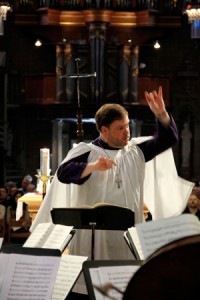
Dr. Horst Buchholz, Vice President of the Church Music Association of America, will be directing one of the polyphony choirs at the Fall Sacred Music Workshop. Buchholz’ choir will sing a variety of polyphonic repertory during the workshop. He will also present a breakout session on Effective Choral Rehearsal Planning. He will also serve as organist for our liturgies.
Horst Buchholz is Director of Sacred Music at the Archdiocese of Detroit and the Cathedral of the Most Blessed Sacrament in Detroit, MI. He previously served as Director of Sacred Music at the Cathedral Basilica of St. Louis and the Archdiocese of St. Louis, as well as Artistic Director of ProArte Saint Louis.
Prior to St. Louis, Dr. Buchholz had served as Organist and Choirmaster at the Cathedral Basilica of the Immaculate Conception in Denver, Colorado and Trinity Cathedral in Cleveland.
Buchholz studied organ and sacred music in his native Germany at the Berlin College of Church Music and graduated with degrees and diplomas in Church Music and Music Pedagogy from the University of Arts in Berlin. His organ teachers have included Heinz Lohmann, Peter Wackwitz, and Rudolf Heinemann. Among his conducting teachers were Martin Behrmann, Uwe Gronostay, and Erich Bergel.
After receiving his teaching certificate in Music Theory and Composition from the University of Arts in Berlin in 1989, Dr. Buchholz continued his post-graduate studies in the United States, where he received his Doctor of Music degree in conducting from the Indiana University School of Music.
As a chorus member and assistant with the Berlin Philharmonic Chorus, he worked with and performed under such eminent maestros as Claudio Abbado, Seiji Ozawa, Kurt Masur, Lorin Maazel, and Herbert von Karajan. Dr. Buchholz’s other accolades and accomplishments include his service as Music Director of the Denver Philharmonic Orchestra, organist and guest conductor appearances with the Colorado Symphony, and Opera Colorado, as well as with orchestras and operas in Mexico, Japan, Korea, and several European countries.
He has performed in major cathedrals and concert halls around the world. In 2009, The Denver Philharmonic named him Conductor Laureate. As a music educator, Dr. Buchholz has served as a member of the organ faculty at Cleveland State University; Associate Professor of Music and Director of Schola Cantorum at St. John Vianney Seminary (Denver); Assistant Professor of Conducting, Director of Orchestral Studies, and faculty member of organ and church music at Lamont School of Music at the University of Denver.
Dr. Buchholz is married to the soprano Dr. MeeAe Cecilia Nam, who is currently on the faculty of Eastern Michigan University.
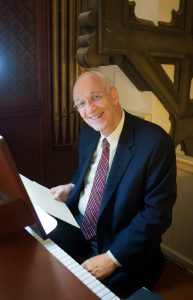 William Mahrt will be providing a breakout session for attendees during the week.
William Mahrt will be providing a breakout session for attendees during the week.
Dr. Mahrt is Associate Professor and Director of Early Music Singers at the Center for Medieval and Early Modern Studies at Stanford University, President of the Church Music Association of America, and editor of Sacred Music, the oldest continuously published journal of music in North America.
Dr. Mahrt grew up in Washington State; after attending Gonzaga University and the University of Washington, he completed a doctorate at Stanford University in 1969. He taught at Case Western Reserve University and the Eastman School of Music, and then returned to Stanford in 1972, where he continues to teach early music. Since 1964 he has directed the choir of St. Ann’s Chapel in Palo Alto, which sings mass and vespers in Gregorian chant on all the Sundays of the year, with masses in the polyphonic music of Renaissance masters for the holy days.
His research interests include theory and performance of Medieval and Renaissance music, troubadours, Machaut, Dufay, Lasso, Dante, English Cathedrals, Gregorian chant, and Renaissance polyphony. He has published articles on the relation of music and liturgy, and music and poetry. He frequently leads workshops in the singing of Gregorian chant and the sacred music of the Renaissance.
Dr. Jennifer Donelson-Nowicka
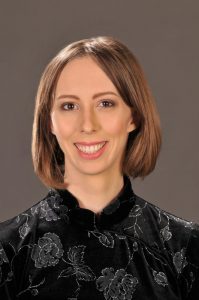 Jennifer Donelson-Nowicka joins the 2022 Fall Workshop Faculty to direct one of the two Polyphony Choirs and a Chant Choir. In addition, she will present a breakout session on Modes and their Pedagogical Utilities. Jennifer Donelson-Nowicka is an associate professor and the director of sacred music at St. Joseph’s Seminary (Dunwoodie) in New York, where she also teaches sacred music courses in the St. Cecilia Academy for Pastoral Musicians.
Jennifer Donelson-Nowicka joins the 2022 Fall Workshop Faculty to direct one of the two Polyphony Choirs and a Chant Choir. In addition, she will present a breakout session on Modes and their Pedagogical Utilities. Jennifer Donelson-Nowicka is an associate professor and the director of sacred music at St. Joseph’s Seminary (Dunwoodie) in New York, where she also teaches sacred music courses in the St. Cecilia Academy for Pastoral Musicians.
She has co-edited Mystic Modern: The Music, Thought, and Legacy of Charles Tournemire, published by the Church Music Association of America (CMAA). Her publications also include articles in the New Catholic Encyclopedia, Sacred Music, Antiphon: A Journal for Liturgical Renewal, the proceedings of the Gregorian Institute of Canada, the Fellowship of Catholic Scholars Quarterly, the Adoremus Bulletin, and Liturgy in the Twenty-First Century (Bloomsbury/T&T Clark).
She was the sometime president and is currently a board member of the Society for Catholic Liturgy, serves on the board of the CMAA, is the managing editor of the CMAA’s journal Sacred Music, and serves on the Archdiocese of New York Music Commission. As academic liaison of the CMAA, she has organized and presented papers at several academic conferences on Charles Tournemire, the work of Msgr. Richard Schuler, and the role of Gregorian chant in pastoral ministry and religious education; she was a co-organizer of the Sacra Liturgia USA 2015 conference in New York, and presented papers at the Sacra Liturgia conferences in New York, London, and Milan.
Donelson-Nowicka was recently named as a Consultant to the USCCB’s Committee on Divine Worship.
Donelson-Nowicka received her DMA in piano performance at the University of Nebraska-Lincoln, where she studied piano with Paul Barnes, Mark Clinton, and Ann Chang in addition to her organ studies with Quentin Faulkner. She received her undergraduate degree in vocal music education and North Dakota State University, where she studied piano with Dr. Robert Groves and conducting with Dr. JoAnn Miller.
Having studied Gregorian chant at the Catholic University of America and the Abbey of St. Peter in Solesmes, for six years Donelson-Nowicka served as a co-organizer of the Musica Sacra Florida Gregorian Chant Conference, and has given chant workshops in dioceses, parishes, and monasteries across the U.S. and Europe. She is a regular member of the faculty at the Church Music Association of America’s annual Sacred Music Colloquium.
Before coming to Dunwoodie, Dr. Donelson-Nowicka served on the faculty at St. Gregory the Great Seminary in the diocese of Lincoln, Nebraska, and at Nova Southeastern University in Fort Lauderdale, where she taught music theory, music history, piano, and directed the university chorale. As a choral conductor, Donelson-Nowicka has directed collegiate, semi-professional, amateur, monastic, and children’s choirs. She currently directs the Schola Cantorum of St. Joseph’s Seminary and the Metropolitan Catholic Chorale. She also regularly teaches Gregorian chant to the contemplative sisters at the Monastery of St. Edith Stein in Borough Park, Brooklyn (Servants of the Lord and the Virgin of Matará [SSVM]), and has also given extended workshops to the Benedictine monks of Silverstream Priory in Ireland (County Meath) and the Benedictine nuns of Priorij Nazareth Tegelen in the Netherlands.
Additionally, she teaches chant to children using the Ward Method at the Colm Cille Club (Pelham, NY) and Immaculate Conception Children’s Schola Cantorum (Sleepy Hollow), and she recently joined the faculty as a music teacher at the Cardinal Kung Academy in Stamford, Connecticut. Dr. Donelson-Nowicka is currently working on a project to adapt the Gregorian chants of the Mass proper for the Spanish language. She also hosts a weekly podcast entitled “Square Notes: The Sacred Music Podcast.”
David Hughes
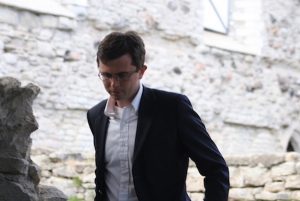 David J. Hughes joins the Fall Sacred Music Workshop faculty this year as director of a Chant Choir. He will also serve as organist for our liturgies during the workshop.
David J. Hughes joins the Fall Sacred Music Workshop faculty this year as director of a Chant Choir. He will also serve as organist for our liturgies during the workshop.
Hughes is currently Organist & Choirmaster at St. Patrick’s Parish and Oratory in Waterbury, Connecticut. He served for thirteen years as Organist and Choirmaster at St. Mary’s Church in Norwalk, Connecticut, where he developed a program of seven choirs, including the professional St. Mary’s Schola Cantorum, the volunteer St. Mary’s Choir, and the St. Mary’s Student Schola, a comprehensive program of musical education for children.
He directs Viri Galilæi, an ensemble of men from the tristate New York area who gather weekly to sing Vespers and medieval polyphony from facsimiles of original manuscripts.
Hughes is Director of Music at St. John Fisher Seminary in Stamford, Connecticut, and serves as a consultant to several parishes in Connecticut looking to expand their musical programs. He is Director of Music for the Roman Forum’s annual two-week Summer Symposium at Lake Garda in Italy, where he directs a choir for daily Masses, a large volunteer choir for nightly Vespers, and coordinates performances and recitals with local groups. He was named Chant Instructor for St. Benedict’s Abbey in Still River, Massachusetts, which he visits every few weeks for musical consultation with the monks.
He travels frequently to give workshops, clinics, and recitals in North America, South America, and Europe; this past season had workshops and recitals in Canada, Italy, and Ecuador. He is currently completing, with librettist Richard Munkelt, an opera based on the life of Gaius Gracchus. In demand as an instructor of Gregorian chant, he frequently travels for workshops, clinics, and recitals. He has written several film scores and a number of Masses and motets. David’s composition teachers have included Ruth Schonthal and John Halle, and he has studied organ with Paul Jacobs and Daniel Sullivan. A native of Stamford, Connecticut, he is a graduate of Yale College.
Rev. Robert Pasley
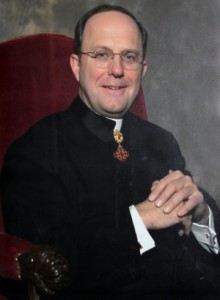 Father Robert C. Pasley, KCHS, is the Chaplain of the Church Music Association of America and has been a member of the CMAA since his ordination. Fr. Pasley will present a breakout session on the Hierarchy of Sung Liturgies and What Should the Priest Sing at Mass?
Father Robert C. Pasley, KCHS, is the Chaplain of the Church Music Association of America and has been a member of the CMAA since his ordination. Fr. Pasley will present a breakout session on the Hierarchy of Sung Liturgies and What Should the Priest Sing at Mass?
He is a priest of the Diocese of Camden, New Jersey. Fr. Pasley will teach a breakout session for clergy and seminarians on pre-1955 Holy Week and another session on singing the three preface tones for the Extraordinary Form.
Because of his association with Msgr. Richard Schuler, he was introduced to the Sacred Music Colloquium and has attended most of the colloquia held since their foundation in 1990. During the tenure of Msgr. Schuler, he was privileged to be the celebrant at orchestral masses at St. Agnes Church in St. Paul, Minnesota. He also serves on the faculty at the Colloquium and has served as Vice President and a member of the board of directors of Sacred Music magazine.
Born on November 20, 1955 in Woodbury, N.J., Father Pasley received a B.A. in Philosophy from St. Charles Borromeo Seminary, Philadelphia, an M.A. in Dogmatic Theology from Mount Saint Mary’s Seminary, Emmitsburg, and an M.A. in Education from Seton Hall University. He was ordained by the Most Reverend George H. Guilfoyle in 1982.
After ordination, Father Pasley was stationed as an assistant priest in parishes throughout the diocese. In 1992, he was assigned to teach high school. He taught for eight years and during that time became Vice Principal for Academics at Camden Catholic High School.
On October 13, 2000, he was appointed Rector, by Bishop Nicholas DiMarzio, of the newly established Tridentine-rite Parish of Mater Ecclesiae, Berlin, N.J. (materlatin.org). Mater Ecclesiae was the first diocesan-run Extraordinary Form parish in the United States. Mater Ecclesiae has a full music program of chant, polyphonic masses, and music based on the principles given by the Church for sacred music.
Along with Dr. Timothy McDonnell, Fr. Pasley established the annual Mass of Thanksgiving on the Feast of the Assumption. This Mass, a grand event for the Delaware Valley, features some of the greatest orchestral masses ever composed for the sacred liturgy. Some mass settings that have been used for the Assumption Mass are Haydn’s Lord Nelson Mass, the Missa Septem Dolorum of Carl H. Biber, Schubert’s Mass in Bb Major, and Mozart’s Missa Brevis in C Major.
Finally, Father Pasley is a Knight Commander of the Equestrian Order of the Holy Sepulchre of Jerusalem and a 4th Degree Knight of Columbus.
Maggie Gallagher
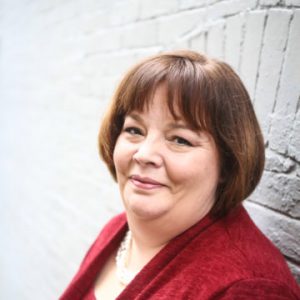 Maggie Gallagher, Executive Director for the Benedict XVI Institute will join us on Friday, September 16 and give a talk about her work with the Institute, the recent highly successful Sacra Liturgia Conference and the Archdiocese of San Francisco during our dinner that evening.
Maggie Gallagher, Executive Director for the Benedict XVI Institute will join us on Friday, September 16 and give a talk about her work with the Institute, the recent highly successful Sacra Liturgia Conference and the Archdiocese of San Francisco during our dinner that evening.
Maggie Gallagher’s experience includes successfully founding two nonprofit organizations, The National Organization for Marriage and the Institute for Marriage and Public Policy. She was also a founding editor of two magazines: the online The National Pulse (which grew quickly under her leadership to 450,000 Facebook likes), and the Manhattan Institute’s quarterly journal of urban policy, The City Journal.
She was a nationally syndicated columnist for 17 years, an editor and a columnist at National Review, and the author or co-author of four books, most recently Debating Same-Sex Marriage (Oxford University Press, 2012).
Fr. Samuel Weber
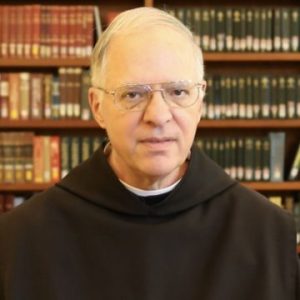 Fr. Samuel Weber will talk to participants on Thursday, September 15, during our dinner at Vallombrosa Retreat Center.
Fr. Samuel Weber will talk to participants on Thursday, September 15, during our dinner at Vallombrosa Retreat Center.
In addition to teaching at St. Patrick Seminary, Father Weber has served as the founding director of the Institute of Sacred Music in the Archdiocese of St. Louis and Magister choir of the Cathedral-Basilica of Saint Louis.
He has served as a faculty member at Kenrick-Glennon Seminary, Wake Forest Divinity School, and St. Meinrad’s College. He received the Licentiate in Sacred theology with a specialization in sacred liturgy and monastic spirituality from the Pontifical Athenaeum Sant’Anselmo in Rome. He studied Gregorian Chant with Dom Eugene Cardine as well as music history and composition at the American Conservatory of Music in Chicago.
His collection of English Chants, The Proper of the Mass for Sundays and Solemnities, published by Ignatius Press, has been a valuable tool for church musicians for several years.
Not a CMAA Member? Join Now.
CMAA Summer Courses – 2022
- Thursday, 10 February 2022 14:10
- SacredMusic
- 0 Comments
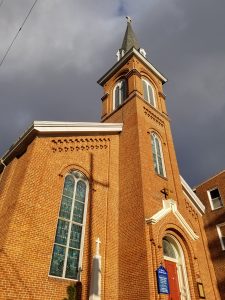 CMAA SUMMER COURSES
CMAA SUMMER COURSES
June 14-18, 2022
St. Mary’s Parish | The Collegium | Hagerstown, Maryland
The CMAA is proud to present three summer courses for 2022. All courses will be held concurrently at the St. Mary’s Parish in Hagerstown, Maryland.
NEW! Vocal Training Intensive, Dr. MeeAe Cecilia Nam, Instructor
Laus in Ecclesia – Level One, (Clear Creek Abbey), Kathy Reinheimer, Instructor
NEW! Laus in Ecclesia – Level Two, (Clear Creek Abbey), Br. Mark Bachmann, Instructor
UPDATE: REGISTRATION IS NOW CLOSED
SPECIAL NOTE
Liability Waiver
All participants are required to sign a Waiver of Liability Relating to Coronavirus / COVID-19.
The Church Music Association of America (CMAA), The Collegium, the Archdiocese of Baltimore, and St. Mary’s Parish cannot prevent you from becoming exposed to, contracting, or spreading COVID-19 while attending CMAA events at the Collegium, St. Mary’s or University of Maryland premises (Summer course premises). It is not possible to prevent against the presence of the disease. Therefore, if you choose to participate in CMAA programs and/or enter onto the premises, you may be exposing yourself to and/or increasing your risk of contracting or spreading COVID-19.
NOTE: If, at any time during the Summer Courses, you develop symptoms that could be Covid-19, or any type of communicable illness, we ask that you refrain from attending sessions, as a way to protect your fellow participants.
HELPFUL LINKS
ONLINE REGISTRATION
VOCAL TRAINING INTENSIVE
This multi-day course will be taught by Dr. MeeAe Cecilia Nam.
The workshop is for singers, teachers of singing, and choral directors. The course will cover the overview of the basic knowledge of the human voice as an instrument and provide practical training to learn and improve vocal and singing skills.
Each session will include a lecture/presentation of chosen topics and introduce helpful exercises to enhance understanding of the objectives and improve their vocal skills.
Participants are encouraged to demonstrate and speak of individual interests and questions during the Q & A session toward the end of each class or leave the instructor a written inquiry.
In addition, everyone will sing various musical examples to apply learned concepts and ideas. Musical examples can include motets, psalms, solo songs and hymns. Participants can also bring the music of their own interest.
All materials required for the course will be provided. Participants are strongly encouraged (not required) to bring along laptops or tablets for use during the course.
Detailed Course Schedule
ONLINE REGISTRATION
LAUS IN ECCLESIA – LEVEL ONE OR TWO
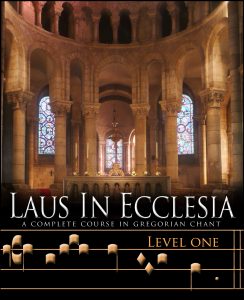 Laus in Ecclesia is a complete course in Gregorian chant in three (3) levels:
Laus in Ecclesia is a complete course in Gregorian chant in three (3) levels:
Level One: Beginners and members of a Gregorian choir
Level Two: More advanced, which could be described as what is necessary to sing in a schola and to sing the more elaborate chants (Graduale, Alleluia, Offertory).
Level Three: Perfecting the Gregorian skills to enable the student to direct a schola or group
This summer’s courses will cover Level One or Level Two. A book will be provided which contains all the course material. The subject matter covers theory and practice.
Theory: recognizing and naming the notes and the neums, rhythmic theory (Solesmes), Latin pronunciation, and finally, modality, all leading up to analysis of a chant.
Practice: Exercises in all theoretical areas mentioned: reading Gregorian notation, intervals, solfeggio, nomenclature of the neums, rhythmic exercises, pronunciation exercises, and rhythmic analysis.
LEVEL ONE
Theory: recognizing and naming the notes and the neums, rhythmic theory (Solesmes), Latin pronunciation, and finally, modality, all leading up to analysis of a chant.
Practice: Exercises in all theoretical areas mentioned: reading Gregorian notation, intervals, solfeggio, nomenclature of the neums, rhythmic exercises, pronunciation exercises, and rhythmic analysis.
In the course of the week, the students will be taken through all 15 lessons of the manual Laus in Ecclesia, level One. Much of the material will be explained, alternated with exercises and examples. Ideally, the manual is meant to provide a whole course with homework assignments at the end of each lesson to be completed and submitted for correction, and an oral practical examination after finishing the course. As it is unlikely that the student will be able to complete all this during the week, these assignments can be completed during the year and an exam can be taken at the next scheduled course, or other arrangements can be made individually.
The book Laus in Ecclesia is the revised edition of the St. Gregoire Schola’s manual. The previous five manuals which provided the teaching matter of the Schola are condensed into three levels with this revision. The first two levels have been published in France (the third is still in process). This course will include the use of the first level, which has been recently published in English. This book provides color diagrams and illustrations to accompany the material. Also included is a CD which provides a model for solfeggio and rhythm exercises. These same tracks will also be available at the Laus in Ecclesia website.
This course will be taught by Kathy Reinheimer, of Reno, Nevada.
LEVEL TWO
Theory: transposition of Gregorian melodies, exhaustive treatment of the psalm tones and liturgical formulas (ex. for the Gospel, readings, collects, etc.), hymnody, deepening of the notions of modality and verbal rhythm introduced in level one. Experienced musicians may want to omit the first day of instruction, which will cover only the mechanisms involved in transposing from Gregorian notation into modern music notation.
Practice: Exercises in all theoretical areas mentioned above in addition to sol-fa: transposition from Gregorian to modern notation, applying the various psalm tones and other liturgical formulas to text, modal analysis, rhythmic analysis of the text in its relation to the music.
This course continues the work on the basics begun in Level One, but on a higher level of difficulty. Completion of level one is normally requisite for level two, but exceptions can be considered: contact Br. Bachmann at guestmaster@clearcreekmonks.org for exceptions. Level two is aimed at the schola member in terms of difficulty, and at those interested in the celebration of the Divine Office in Latin in terms of content.
Those attending level two classes will need either a Graduale Romanum or a Liber Usualis or a Gregorian Missal.
Br. Mark Bachmann, choirmaster for Clear Creek Monastery will teach this course, sharing his many years of experience with class participants.
FACULTY
Dr. MeeAe Cecilia Nam
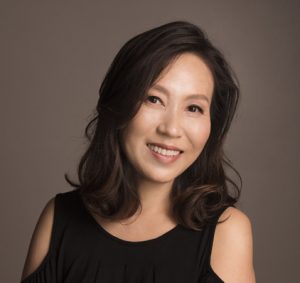 Dr. MeeAe Cecilia Nam will teach Vocal Training Intensive during the CMAA’s summer course program.
Dr. MeeAe Cecilia Nam will teach Vocal Training Intensive during the CMAA’s summer course program.
Dr. MeeAe Cecilia Nam, soprano, has received the following praise: “…whose voice is the epitome of Mozartean elegance and lyricism…” (New York Concerts Review), “…sings easy, flawlessly and effortlessly expressive” (the German Passauer Presse). She has appeared as guest artist with numerous ensemble groups and festivals, such as the Colorado Symphony, Boulder Philharmonic, Colorado Summer Music Festival, the American Liszt Society, Boulder Bach Festival, Vianden International Music Festival, and the Concert Series of the Salzburg Summer Music Festival. Known for her musical versatility, sensitivity and genuine interpretation (the Denver Post), she has had a rich performance experience as a soloist in recitals, oratorios, sacred music, chamber and orchestral concerts, and stage works throughout the United States, Germany, Austria, and South Korea. With Dr. Horst Buchholz, organist and conductor, she has toured the U. S. and Europe with special recital programs of Sacred Music for Voice and Organ in the past 15 years.
She has performed and premiered music written for her, and participated in many artistic collaborations with current composers in their works, including Joseph Dorfman’s one act opera Shulamith (Colorado premier), Voice of River Han by David Mullikin, David Kirtley’s Haiku songs of Karigane, Tan Dun’s Silkroad, and James Mobberly’s Words of Love. Her performances of Georgy Kurtag’s Kafka Fragmente have received the acclaim “…Challenging music….Nam soared through it brilliantly, but brought that necessary degree of dramatic involvement as well … it was first-rate.”, by Colorado Rocky Mountain News.
In addition to her position as Professor of Voice at Eastern Michigan University, she has been on the faculty of the Church Music Association of America and at the Vianden International Summer Festival and School in Luxembourg. She has also been Guest Artist and Clinician at numerous institutions such as the Hochschule für Musik Hanns Eisler in Berlin, the Korean National University of Arts in Seoul, the Seoul National University of Education, University of Colorado in Boulder, and University of Tennessee in Knoxville, among many others.
Dr. Nam has developed a well-deserved reputation as an important scholar of the rare French song literature of Théodore Gouvy (1819-1898). She has also recorded a CD, Songs of Gouvy, for the Toccata Classics label. A few of the Gouvy songs have been previously recorded, but this is the first CD made of this important composer where the songs are performed in the original key in which they were written. Most of the songs on the CD have never been recorded.
She has published a critical edition of Gouvy’s songs in two volumes with EC Schirmer in 2018. These two volumes are a unique and exclusive publication, and a valuable contribution to song literature. They are the result of her extensive scholarship and research in France, Germany, and the United States.
Kathy Reinheimer
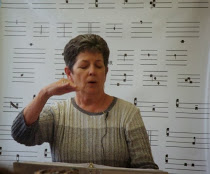 Kathy Reinheimer will teach Clear Creek Monastery’s Laus in Ecclesia – Level One. This course is offered for the third time this summer and will use the Manual Laus in Ecclesia, Level One, revised and translated from the French edition.
Kathy Reinheimer will teach Clear Creek Monastery’s Laus in Ecclesia – Level One. This course is offered for the third time this summer and will use the Manual Laus in Ecclesia, Level One, revised and translated from the French edition.
From her earliest years in Catholic school, Kathy Reinheimer had a strong attraction to the sacred liturgy and to sacred music in particular.
A Cradle Catholic, and admitted “chant addict,” Kathy attended 12 years of Catholic school at a time when students were thoroughly trained in the structure of the Mass, sang Gregorian chant, attended daily Mass and frequently provided music for funerals and special Masses. The Second Vatican Council was at its midpoint when she graduated from high school. This provided her with the opportunity to have a thorough understanding of the liturgy – both pre- and post-Conciliar.
Kathy’s later affiliation with the Church Music Association of America (CMAA) provided solid training by a world class faculty in sacred music and liturgy. Instructors included Theodore Marier, Paul Salamunovich, Rev. Prof. Dr. Robert A. Skeris (Theology of Worship and Its Music), Prof. William Mahrt, Scott Turkington, Wilko Brouwers and many others who generously shared their knowledge.
Through CMAA, she became interested in the “Laus in Ecclesia” program from Clear Creek Monastery. Kathy completed the Level One course and is looking forward to Level Two which is just being made available.
Her training and over 40 years of experience in directing sacred music have gained Kathy the reputation of being a fine director and teacher. She is highly respected among her musical peers.
Kathy currently directs Regina Pacis Cantorum (Queen of Peace Choir), a 501(c)(3) organization dedicated to the Immaculate Heart of Mary and to the preservation of the traditional music of the Roman Catholic Church. Regina Pacis sings by invitation at Masses throughout the Diocese of Reno and the Sierra Nevada community of Truckee, CA. Kathy also mentors Holy Spirit Mission Choir, a small group singing for the Tridentine Rite (Extraordinary Form) chapel, where she provides training in Gregorian chant.
Kathy recently retired after a professional career in Human Resource management. She and her husband, Bob, have been married for over fifty years.
Brother Mark Bachmann
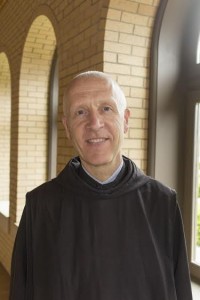 Br. Mark Bachmann will teach Clear Creek Monastery’s Laus in Ecclesia – Level Two. This course is offered for the first time this summer. All materials will be provided for the course from the soon-to-be published Laus in Ecclesia – Level Two book, revised and translated from the French edition.
Br. Mark Bachmann will teach Clear Creek Monastery’s Laus in Ecclesia – Level Two. This course is offered for the first time this summer. All materials will be provided for the course from the soon-to-be published Laus in Ecclesia – Level Two book, revised and translated from the French edition.
After earning a Bachelor’s degree in liberal arts, Brother Mark Bachmann entered Fontgombault, a Benedictine monastery in France, where he was ordained a priest in 1991. He sang in the Fontgombault schola, after which he functioned as precentor at Gaussan for five years. He attained the 4th degree of the St. Gregoire schola.
Sent as one of the 13 founders of Clear Creek monastery in 1999, he has served as choirmaster at the monastery since 2009. He was on the CMAA faculty for the 2016 Colloquium in St. Louis, MO.
REGISTRATION INFORMATION
Registration fees are: $375 for the courses, which includes books and materials needed for the courses. A $50 discount is available to CMAA Members with the discount code applied. After May 15th, a $50 late fee will apply. Registration includes a $75 non-refundable deposit. Lunches will be provided Wednesday – Saturday. If you have special dietary needs, please register for “Special Meals” and send us an email at programs@musicasacra.com to indicate what those needs are. Please indicate which of the three courses you will attend with your registration.
To register: Choose one of our three courses offered this year:
Vocal Training Intensive
Laus in Ecclesia – Level One
Laus in Ecclesia – Level Two
(CMAA members) To secure your extra tuition discount ($50), apply the member coupon code at checkout time. Members can find the code in your e-mail announcement or contact the CMAA office for it.
REGISTER ONLINE NOW
Are you a CMAA Member? If not, why not join CMAA today? Click this link.
MINORS
We cannot allow minors to register for this summer’s course. You must be 18 years of age or older by June 14, 2022.
HOTEL ACCOMMODATIONS
Hotel Accommodations are available at the Ramada Plaza Hagerstown, 1718 Underpass Way, Hagerstown, MD 21740, (301) 797-2500 at a special rate of $119/night. Next to the Ramada Plaza is also another hotel option: Holiday Inn Express & Suites, 241 Railway Ln., Hagerstown, MD 21740, (301) 745-5644. Rooms at the Holiday Inn Express are available at a special rate of $129/night. Make your reservation on or before Sunday, May 1, 2022 to get the special group rate (Don’t delay in making your reservations! It is sports season in Hagerstown in June.).
PLEASE CALL RAMADA PLAZA HOTEL for Reservations at: (301) 797-2500.
PLEASE CALL HOLIDAY INN EXPRESS for Reservations at: (301) 745-5644.
Amenities include free internet in all guest rooms, as well as free hot breakfasts. These hotels are not within walking distance, so please plan to make arrangements for your local transportation.
CANCELLATIONS
Requests received in writing at the CMAA offices (by mail or email) by May 1st will receive a refund less the nonrefundable $75 deposit. Refunds may be processed after the Summer courses have concluded. Any requests for cancellation after May 1st may only receive a partial refund, due to non-refundable charges for meals, etc.
top of page
CODE OF CONDUCT
Please note that all participants are expected to adhere to the CMAA Code of Conduct.
